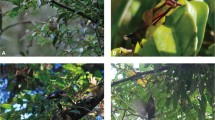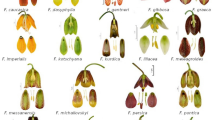Abstract
THE members of the genus Monarda are usually pollinated by bees and wasps. The latter will also nip holes into the backs of the expanded corolla tubes to take the nectar directly and thus circumvent the process of pollination. Some corollas, like those of M. clinopodia and M. lindheimeri, are very rich in nectar. Nectaries are located in the throat of the corolla tube from the opening downward toward the base, and consist of short hair-like glands. They are protected by a dense ring of non-glandular pubescence at the inner throat opening. In the small and abruptly expanded corolla tubes of the sub-genus Cheilyctis the nectaries extend over a more restricted area than in the larger and more evenly expanded corolla tubes of most species in the sub-genus Monarda.
This is a preview of subscription content, access via your institution
Access options
Subscribe to this journal
Receive 51 print issues and online access
$199.00 per year
only $3.90 per issue
Buy this article
- Purchase on Springer Link
- Instant access to full article PDF
Prices may be subject to local taxes which are calculated during checkout
Similar content being viewed by others
References
Meeuse, B. J., The Story of Pollination, 35 (The Ronald Press Co., New York, 1961).
Author information
Authors and Affiliations
Rights and permissions
About this article
Cite this article
SCORA, R. Dependency of Pollination on Patterns in Monarda (Labiatae). Nature 204, 1011–1012 (1964). https://doi.org/10.1038/2041011a0
Issue Date:
DOI: https://doi.org/10.1038/2041011a0
This article is cited by
-
Nectar discovery speeds and multimodal displays: assessing nectar search times in bees with radiating and non-radiating guides
Evolutionary Ecology (2017)
-
Induced mutations affecting pollinator choice in Mimulus lewisii (Phrymaceae)
Arthropod-Plant Interactions (2011)
-
The effect of nectar guides on pollinator preference: experimental studies with a montane herb
Oecologia (1985)
Comments
By submitting a comment you agree to abide by our Terms and Community Guidelines. If you find something abusive or that does not comply with our terms or guidelines please flag it as inappropriate.



